This article gives an insight into what the RIPE NCC's data shows us about Greece and its neighbouring coutries in terms of membership development, IPv6 deployment and RIPE Atlas coverage, among other factors.
On 26 May 2017, the Greek Network Operators' Group (GRNOG) holds its first full-day workshop in Athens. The NOG has grown steadily since it started in 2015, and over 100 people are expected to attend this meeting. The RIPE NCC will be attendance, and this article provides some background information on how we see developments in Greece and four countries surrounding it - Albania, Bulgaria, Cyprus and the Former Yugoslav Republic of Macedonia (FYROM).
In the table below, you can see geographic and demographic information for the countries we look at. Figures for area and population are from Wikipedia.
| Country | Population | Area (km2) | LIRs |
|---|---|---|---|
| Greece | 10,783,748 | 131,990 | 68 |
| Cyprus | 848,300 | 9,251 | 68 |
| Bulgaria | 7,101,859 | 110,879 | 136 |
| FYROM | 2,071,278 | 25,713 | 25 |
| Albania | 2,876,591 | 28,748 | 48 |
Please note that this article, unless otherwise noted, shows a snapshot of the situation as seen on 22 May 2017. However, in most cases we also provide a link to the most up-to-date information.
Countries at a Glance
| Country | Greece | Cyprus | Bulgaria | FYROM | Albania |
|---|---|---|---|---|---|
| Number of ASNs assigned | 189 | 102 | 704 | 44 | 56 |
| Number of Local Internet Registries | 68 | 68 | 136 | 25 | 48 |
| Number of IPv4 allocations | 165 | 111 | 748 | 110 | 85 |
| Number of IPv4 assignments | 130 | 70 | 243 | 11 | 6 |
| Number of IPv4 addresses allocated | 4,661,248 | 1,042,432 | 4,272,128 | 681,984 | 353,280 |
| Number of /22s allocated from the last /8 | 55 | 38 | 122 | 24 | 41 |
| Number of IPv6 allocations | 54 | 37 | 124 | 23 | 31 |
| Size of IPv6 allocations (/32s) | 232 | 148 | 519 | 103 | 157 |
| Number of IPv6 assignments | 54 | 37 | 124 | 0 | 31 |
| RPKI with route object authorisation (ROAs) | 15 | 7 | 29 | 2 | 18 |
Membership Growth
In Figure 1, you can see the growth of the number of Local Internet Registries (LIRs) in Greece, Albania, Bulgaria, Cyprus and FYROM. As of 22 May 2017, there are 68 LIRs registered in Greece.
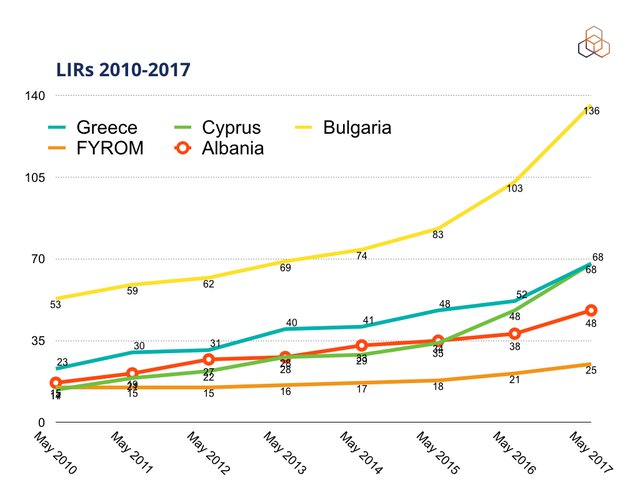
Figure 1: Number of LIRs in Greece, Cyprus, Bulgaria, FYROM and Albania on 22 May 2017
For comparison, Figure 2 shows the growth in the number of all LIRs registered with the RIPE NCC since 2008. There are currently over 15,700 LIRs registered with the RIPE NCC. Note that the numbers for 2017 only contain data up to 22 May.
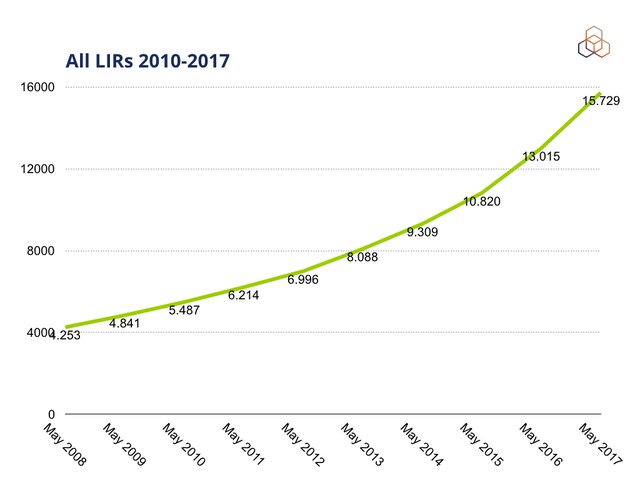
Figure 2: Number of all LIRs in the RIPE NCC service region from 2008 - 2017
The next figure shows the age of the LIRs in Greece. You can see that 18 LIRs in Greece have joined the RIPE NCC in the past two years, while the next biggest grouping of Greek LIRs is those who are ten years or older.
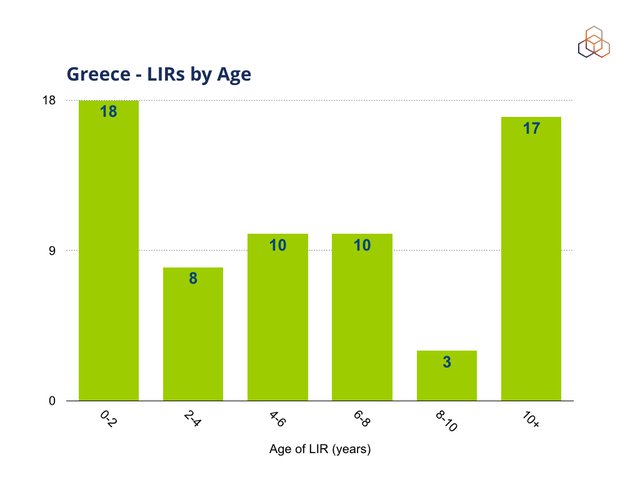
Figure 3: Age of LIRs in Greece
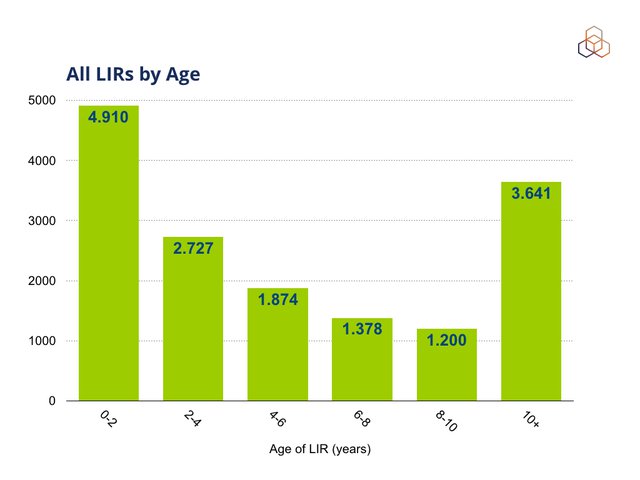
Figure 3b: Age of all LIRs in RIPE NCC service region
IPv6 Deployment in Greece
IPv6 RIPEness is a rating system that awards stars to LIRs in the RIPE NCC service region depending on indicators of IPv6 preparedness. Stars are awarded for:
- Having an IPv6 allocation or assignment from the RIPE NCC
- Making the IPv6 prefix visibility in the Routing Information Service (RIS)
- Having a route6 object registered in the RIPE Database
- Having reverse DNS delegation set up for the IPv6 allocation
Figure 4 shows the situation in Greece. You can see that 79% of all LIRs in the country have an IPv6 allocation and 45% of Greek LIRs have done something with their IPv6 allocation. Only 21% don't have an IPv6 allocation yet.
You can also see from APNIC's IPv6 Capability Metrics that Greece ranks in the top five European countries in terms of IPv6 capability, due in large part to the fact that two of the largest ISPs have fully deployed IPv6.
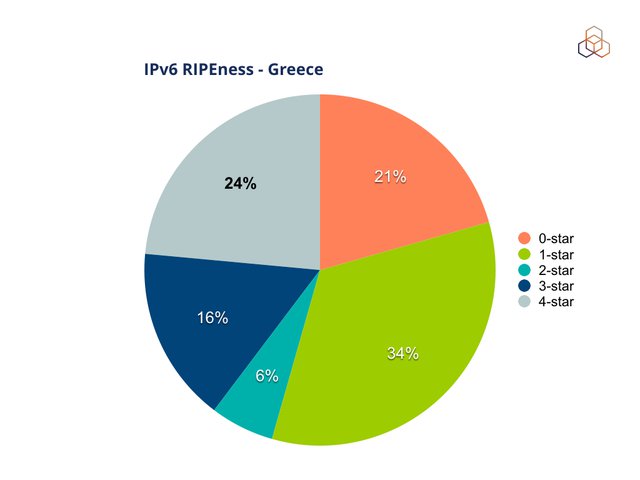
Figure 4: IPv6 RIPEness in Greece
In Figure 5, you can see the situation for all LIRs in the RIPE NCC service region. 74% of all LIRs have an IPv6 allocation, and around 45% have started using it one way or another (by meeting one of the criteria listed above).
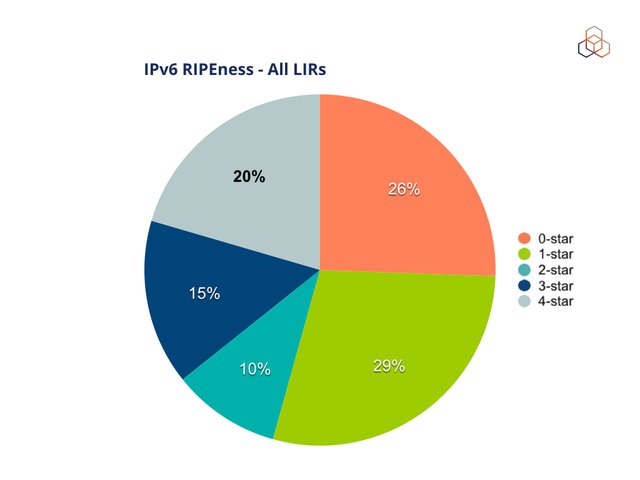
Figure 5: IPv6 RIPEness for all LIRs
In Figure 6, we show the percentage of ASes announcing one or more IPv6 prefixes in Greece and the countries we compare it with. You can find the current status of these countries using the IPv6 Enabled Networks tool. This tool also allows you to search for other countries or regions worldwide.
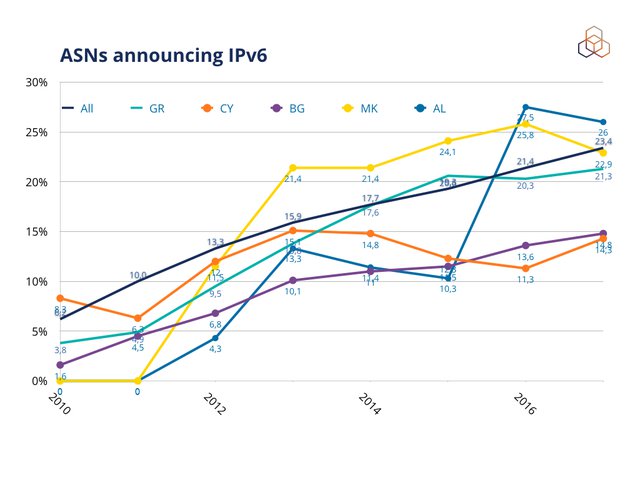
Figure 6: ASes announcing one or more IPv6 prefixes in Greece, Cyprus, Bulgaria, FYROM and Albania
Country Routing Statistics
Figure 7 visualises the development of the IPv4 and IPv6 prefixes and ASes in Greece over time.
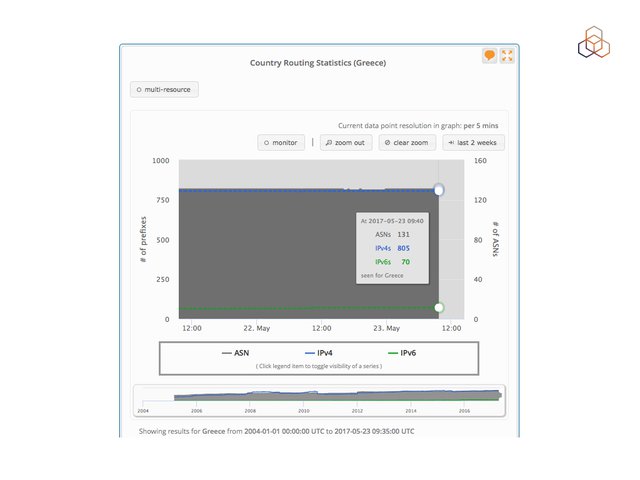
Figure 7: RIPEstat country routing statistics in Greece
You will notice that the number of IPv6 prefixes and the number of ASNs in this widget are not consistent with the number shown in the table above. The table shows those allocations and assignments made by the RIPE NCC to organisations registered in Greece. The RIPEstat widget on the other hand shows what's actually happening in the real world: The 165 IPv4 allocations made by the RIPE NCC have been de-aggregated into 805 individual prefixes that are announced by 131 ASes (instead of the 189 ASes assigned by the RIPE NCC to organisations in Greece).
You can see the current status in the RIPEstat country routing widget. You can also use that widget to compare multiple countries.
RIPE Atlas
RIPE Atlas is a global network of probes that measure Internet connectivity and reachability, providing an unprecedented understanding of the state of the Internet in real time. The more probes that are distributed and connected worldwide, the more useful data can be collected that can then be used by network operators and researchers to analyse the state of the Internet.
The embedded RIPEstat widget below shows the number of RIPE Atlas probes in the region. Green dots indicate connected probes, yellow dots show disconnected probes and red dots indicate those that are abandoned (i.e., not connected for more than three months).
If you have a RIPE Atlas probe, please double-check it is connected properly so that the community can benefit from the data it produces
RIPEstat widget will be rendered here
Figure 8 shows the actual number of RIPE Atlas probes in Greece, Cyprus, Bulgaria, FYROM and Albania.
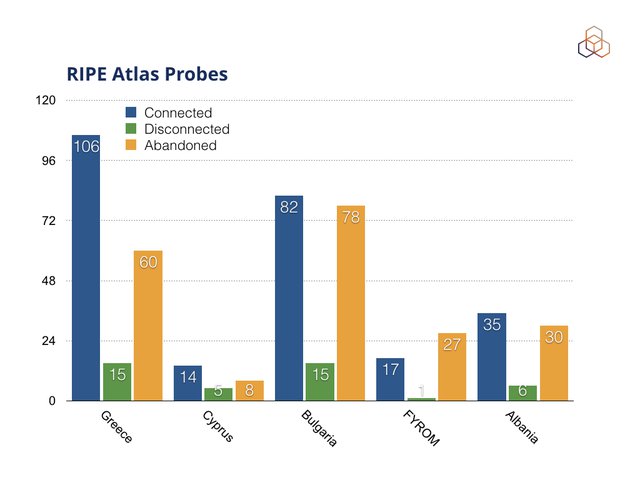
Figure 8: Number of RIPE Atlas probes in Greece, Cyprus, Bulgaria, FYROM and Albania
Participation at the General Meeting
The RIPE NCC General Meeting (GM) took place in Budapest from 10-12 May. This is the forum where, twice a year, RIPE NCC members can register to have their say on how the RIPE NCC operates.
At the recent GM, members elected three members of the RIPE NCC Executive Board and approved the RIPE NCC Charging Scheme 2018.
Almost 1,400 members registered for the GM. Of these, 11 members from Greece registered to participate. Figure 9 shows the registration numbers for Greece since electronic participation became available in 2014.
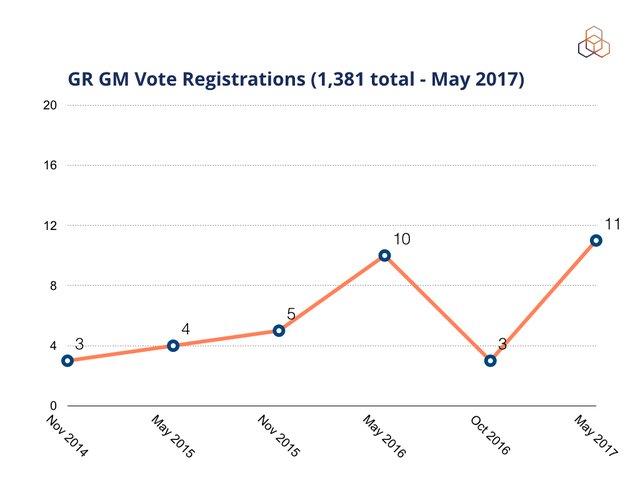
Local Networking Communities
As noted above, the Greek Network Operators' Group (GRNOG) holds its first day-long workshop this week, and the quality of the agenda demonstrates how far the group has come in the few years since its establishment. The workshop has presentations from local operators, the RIPE NCC and global players such as NTT and Akamai. The RIPE NCC is proud to be a sponsor of GRNOG and we recommend that all Greek operators follow its progress and get involved where possible.
Conclusion
The Greek story as seen from the RIPE NCC is one of very positive development in recent years, both in terms of numbers and the people-driven community. The number of LIRs in Greece has grown considerably in the last two years, while there is still a strong group of older members, contributing to a good mix of the experienced and newer players in the Greek environment. In terms of IPv6, Greece sits at around the average number of ASNs announcing IPv6 but this does not tell the whole story. Two of the larger ISPs in Greece have fully deployed, meaning that Greece ranks very highly in terms of IPv6-capable countries in Europe. Importantly, the local community has organised itself around a NOG that has become established and capable of attracting good local content as well as speakers from the wider community that bodes well for future developments in Greece.


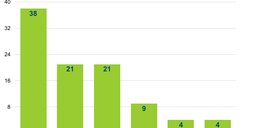
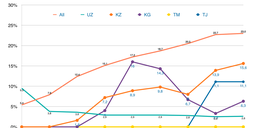
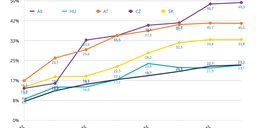
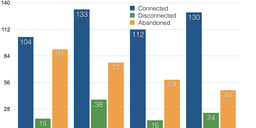
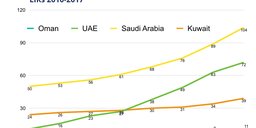
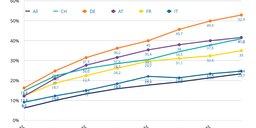



Comments 0
Comments are disabled on articles published more than a year ago. If you'd like to inform us of any issues, please reach out to us via the contact form here.